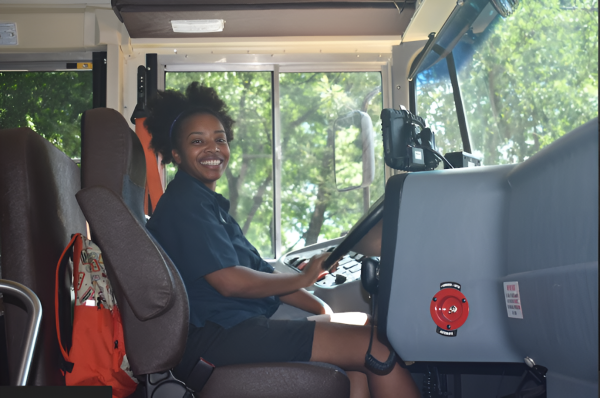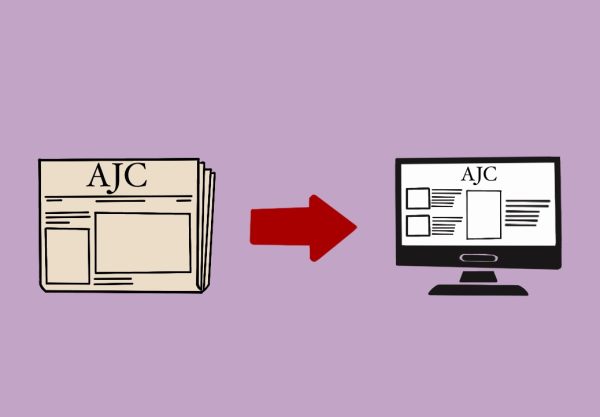Bockman’s reflections on the previous months and the 2017-2018 school year
By Parker Killenberg
Over the course of this year, Grady has experienced several changes in terms of the policy introduced by Principal Dr. Betsy Bockman. Using experience and knowledge honed as an administrator at several Atlanta Public Schools and Grady cluster schools, Bockman will continue to work to improve quality of education at Grady in the future.
One of the most impactful courses of action that Dr. Bockman took was to limit the number of students who came tardy to school every day.
“The first couple of days [of school] I observed so many kids late,” Dr. Bockman said. “I was shocked by it; it worried me the first day.”
In response to this realization, Dr. Bockman looked at pre-existing policy in the Atlanta Public Schools’ handbook and implemented the consequences to encourage students to come to school on time.
“There has been that same kind of come when you come, start time is flexible mentality,” Dr. Bockman said. This school is undergoing the change to be here at a certain time, but you get to have a clean slate after five days.”
While this policy has not made huge strides in improving the attendance of Grady students, Dr. Bockman is confident that it has made an impact.
“I haven’t seen this huge decrease in tardy arrival that I had hoped for, but teachers are also more consistent with marking kids late,” Dr. Bockman said.
The policy outlines a five day consequence plan for being late. If you are late once in five days, it is okay, however, arriving tardy two or three days out of the week leads to after school detention and in school suspension, respectively.
While in previous years students could rely on the ever handy “start time extension,” Dr. Bockman’s policy enforces tardiness with an iron fist, urging students to get to class or face the consequences. Teachers and students alike are fans of the attendance policy that has kids running to class. “The tardy policy incentivizes coming to school on time,” junior Jazmin Cruz said.
The policy is working to improve attendance for students, however teacher attendance is also being enforced to ensure all attendees of Grady are arriving promptly.
“Regardless of situations outside of school, we have to be on time and not take critical or noncritical days off,” Spanish teacher Enoch Gill said. “We must get an excuse, which is good because teachers need to be on time like students.”
Dr. Bockman understands the importance of timeliness in education and is focusing efforts in the present and future on maximizing teacher and student time together to enhance learning. “In my experience of twenty years as a principal, the most important thing is time,” Dr. Bockman said. “We have to protect every minute of instructional time at school.”
To further maximize the effectiveness of material for student’s learning, Dr. Bockman implemented an additional policy to limit late work, setting two deadlines per semester for students to turn in their assignments.
“I don’t like the late work policy,” junior Hannah Prausnitz Weinbaum said. “You shouldn’t be able to turn in late work two months after it was due, and teachers have to take that now.”
“I think the late work policy is an excellent policy,” Gill said. “It helps everyone get caught up and on task; students won’t get stuff out of work if it’s later.”
The late work policy at Grady benefits teachers by forcing students to turn in their work in advance of the grading deadline, however some teachers are wary of the reality of late work in the real world. “There is no such thing as late work in college,” Grady teacher Sara Looman said. “We’re supposed to be preparing kids for the real world while also making sure they know the information.”
Along with her crusade to eliminate late work, Bockman moved to strengthen learning by implementing the retake policy at Grady for all classes.
“I don’t think the retake policy is good because every teacher has different standards and levels,” Cruz said. “It doesn’t make sense.”
While the retake policy may not fit well with everyone, some see the benefits of allowing retesting. Before the policy was implemented, there was not a standard for all classes; while some teachers allowed retakes and test corrections, others offered no way to redeem poor scores. “I like that there are retakes,”senior Rose Tehrani said. “It should depend on what the teacher and student want; I don’t think one policy is good for everyone.”
Along with students, teachers see the upsides of retakes in insuring that students learn the material and prepare for future assessments.
“I don’t mind the retake policy; i’m doing it now with the test corrections.” Looman said. “The is a balance between helping them and making them accept responsibility.”
“We all provide retake anyway,” Gill said. “I like that its uniform; everyone’s on the same page.”
As well as timeliness, Dr. Bockman intends to focus the majority of her resources during her time at Grady on equity of learning. “I am working for every level to have really good teachers,” Dr. Bockman said.
Bockman is also adding a math teacher position and Special Ed teachers that we were previously allotted. Bockman is working to complete I’m working on teacher practices; moving teachers and classes around to better practices; combination of gradual release; better plan for teaching in high school; offering support to teachers; teacher keys evaluation system
In addition to improving quality of education in classrooms, Dr. Bockman has pledged to work closely with teachers to improve class sizes. Through teacher training, she has been able to educate teachers on different methods of teaching that accommodates different students.
“A lot of teachers don’t get the opportunity to observe other classes,” Dr. Bockman said. “We look at every aspect of the classroom and how to improve it.”
A couple of years ago, Dr. Bockman went completely deaf and turned from an auditory to a visual learner. Because of this, she is keenly aware of the various learning styles and how little teachers do to address everyone’s learning needs.
“I have to make sure there are maps [in a history class] for different types of learners,” Dr. Bockman said. “Some kids can’t listen and write at the same time either.”
Above all, Dr Bockman is committed to maximizing time for student and teacher connections and making sure that the class periods are being used most efficiently to everyone’s benefit. “Time is so urgent,” Dr. Bockman said. “ I so respect the teaching profession and I hate to see time wasted.”
While some teachers have seen the upside to Dr. Bockman’s suggestions, others are stuck in their ways. Dr. Bockman’s commitment to classroom equity and the quality of education for every student at Grady differs from the leadership teachers have had in the past.
“We have a stubborn group of teachers,” Dr. Bockman said. “I’m trying to get them to understand that the independence that they’ve had for years only works for a certain group of kids.”
For the upcoming 2017-20178 school year, Dr. Bockman will focus on balancing classes and making all classes more engaging. The administration has seen new found interest in the CTAE classes with the pathways such as healthcare and law lacking the excitement they once had.
“Kids really want to take this digital technology class,” Dr. Bockman said. “Latin and engineering classes are exploding.”
Because of the changing interest, Dr. Bockman is also trying to reapportion money to provide needed improvements for these classes; she is asking the Grady foundation to put the extra theater money raised towards training for CTAE teachers and Special Ed resources. “I am also asking the foundation for a new Chromebook cart and new technology in labs,” Dr. Bockman said. The technology in the labs is very old; [its] been neglected.”
Over the months that Dr. Bockman assumed the role of principal at Grady, she has rocked a lot of boats, changing policies long in place and implementing several changes for the future. While her journey has been admittedly tumultuous, Grady students are confident in her leadership abilities for the coming years.
“I think that the initial fear of her was not warranted,” Prausnitz-Weinbaum said. “She’s really not that bad; I don’t have a problem with her.”
Parker Killenberg is a senior and the AME for the A&E section. She enjoys taking part in activities including Model UN and Grady's IGNITE chapter and...





